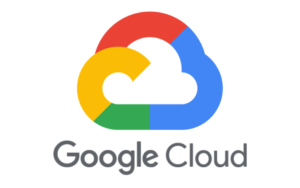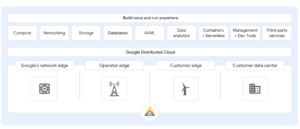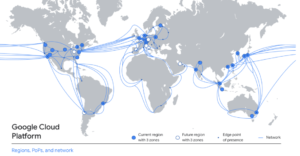

Google Cloud kicked off its Next ‘21 conference today with a torrent of news impacting a wide swath of its big data, advanced analytics, and AI offerings, including the unveiling of Google Distributed Cloud, a new data science notebook for Vertex AI, and the launch of Spark on Google Cloud, among others.
Let’s start with Google Distributed Cloud, which is a new portfolio designed to extend Google Cloud offerings to the edge and to customer and partner data centers. The offering will allow customers to run their Google Cloud services in a variety of places, including the 140+ Google network edge locations around the world, operator edges maintained by communication service providers (CSPs), and customers’ own data centers or edge locations.
Google Distributed Cloud is based on Anthos, Google Cloud’s platform for hybrid cloud computing, and eventually will encompass many of Google Cloud’s services (but obviously not Spanner, which requires specialized hardware and is available in a limited array of Google Cloud data centers around the world; see “Google Cloud Gives Spanner a PostgreSQL Interface” for Datanami’s exclusive coverage of Google Cloud’s Spanner news).
The first two products that Google Cloud is launching under the new banner are Google Distributed Cloud Edge and Google Distributed Cloud Hosted. Google Distributed Cloud Edge is aimed at bringing the expected influx of 5G radio traffic closer to customer applications like computer vision and Google AI edge inferencing applications, which will minimize latencies and maximize customer experience.
Sachin Gupta, vice president and general manager of Open Infrastructure at Google Cloud, says Google Distributed Cloud Edge will “5G-enable” the digital economy for services like ride sharing and food delivery.

Google Distributed Cloud will encompass a range of Google Cloud offerings (Image source Google Cloud)
“By moving these compute workloads closer to the user, together with our telco partners, we can reduce latency levels and offer a whole new range of mobile experiences that were simply not possible before,” he said during a press briefing last week.
Google Distributed Cloud Hosted, meanwhile, is designed for more sensitive workload that need to meet strict data residency, security, and privacy requirements. The offering does not require any connectivity to Google Cloud at any time to manage infrastructure, services, APIs, or tooling, the company says. Users will manage it via an Anthos control plane. It will be available in preview in the first half of 2022, Google says.
Google is partnering with two European companies to deliver Google Distributed Cloud Hosted as part of its “Cloud. On Europe’s Terms” initiative. That includes T-Systems, which is building a “sovereign cloud offering” for public sector organizations in Germany, and OVHCcloud, which is doing something similar in France.
The company also launched Vertex AI Workbench, a data science notebook offering to go along with Vertex AI, which it launched in May. The key aspect of Vertex AI Workbench is it works across all of Google Cloud’s offerings, including BigQuery, Dataproc, and Dataplex, said Gerrit Kazmaier, Google Cloud’s vice president and general manager of databases, data, analytics, and Looker.
“We‘ve seen an incredible increase in productivity, more than a five times increase in development productive, meaning reduced time of development because data scientist and data engineer do not need to context switch anymore,” Kazmaier said during the press briefing. “They have the same experience as they go across the full machine learning development lifecycle.”
Similarly, the company also announced Spark on Google Cloud. Currently in preview, the offering makes Spark “a premium offering on Google Cloud,” and is aimed primarily at data engineers, the company said. Spark on Google Cloud will be available to users regardless of whether they start in BigQuery, Dataproc, Dataplex, or Vertex AI, the company said.
The Mountain View, California company also announced the general availability of BigQuery Omni, the hybrid big data analytics offering it originally unveiled in July 2020. With BigQuery Omni, customers have the capability to use BigQuery to analyze data that’s residing in Google Cloud, AWS, and Microsoft Azure, without moving data sets.
The company also announced expanded partnerships with several vendors in the big data space. The partership with Tableau, for instance, will enable the visualization leader to access Looker’s semantic layer. Current Looker users will also be able to expand the semantic layer to Tableau. Google Cloud also said it was expanding work with Collibra, Informatica, Fivetran, and Databricks.
Google Cloud Next ’21 is taking place today through Thursday. Google Cloud CEO Thomas Kurian and Sundar Pichai, the CEO of Google and parent company Alphabet, will be kicking things off with a keynote this morning at 9 a.m. PT. See cloud.withgoogle.com/next for more information.
Related Items:
One on One with Google Cloud Product Director Irina Farooq
March 26, 2025
- Quest Adds GenAI to Toad to Bridge the Skills Gap in Modern Database Management
- SymphonyAI Expands Industrial AI to the Edge with Microsoft Azure IoT Operations
- New Relic Report Reveals Media and Entertainment Sector Looks to Observability to Drive Adoption of AI
- Databricks and Anthropic Sign Deal to Bring Claude Models to Data Intelligence Platform
- Red Hat Boosts Enterprise AI Across the Hybrid Cloud with Red Hat AI
March 25, 2025
- Cognizant Advances Industry AI with NVIDIA-Powered Agents, Digital Twins, and LLMs
- Grafana Labs Unveils 2025 Observability Survey Findings and Open Source Updates at KubeCon Europe
- Algolia Boosts Browse with AI-Powered Collections
- AWS Expands Amazon Q in QuickSight with New AI Scenarios Capability
- Komprise Automates Complex Unstructured Data Migrations
- PEAK:AIO Chosen by Scan to Support Next-Gen GPUaaS Platform
- Snowflake Ventures Deepens Investment in DataOps.live to Advance Data Engineering Automation
- KX Emerges as Standalone Software Company to Make Temporal AI a Commercial Reality
- PAC Storage Unveils 5000 Series Data Storage Solutions
March 24, 2025
- Tessell Introduces Fully Managed Database Service on Google Cloud
- Datavault AI Joins IBM Partner Plus to Transform AI-Driven Data Monetization
- Cerabyte Unveils Immutable Data Storage for Government Customers
- Provenir Highlights AI-Driven Risk Decisioning in Datos Insights Report
- Algolia Showcases Powerful AI-Driven Search at ShopTalk Spring 2025
- StarTree Awarded 2025 Confluent Data Flow ISV Partner of the Year – APAC
- PayPal Feeds the DL Beast with Huge Vault of Fraud Data
- OpenTelemetry Is Too Complicated, VictoriaMetrics Says
- When Will Large Vision Models Have Their ChatGPT Moment?
- The Future of AI Agents is Event-Driven
- Accelerating Agentic AI Productivity with Enterprise Frameworks
- Your Next Big Job in Tech: AI Engineer
- Data Warehousing for the (AI) Win
- Nvidia Touts Next Generation GPU Superchip and New Photonic Switches
- Krishna Subramanian, Komprise Co-Founder, Stops By the Big Data Debrief
- Alation Aims to Automate Data Management Drudgery with AI
- More Features…
- IBM to Buy DataStax for Database, GenAI Capabilities
- Clickhouse Acquires HyperDX To Advance Open-Source Observability
- NVIDIA GTC 2025: What to Expect From the Ultimate AI Event?
- Excessive Cloud Spending In the Spotlight
- EDB Says It Tops Oracle, Other Databases in Benchmarks
- Databricks Unveils LakeFlow: A Unified and Intelligent Tool for Data Engineering
- Google Launches Data Science Agent for Colab
- Meet MATA, an AI Research Assistant for Scientific Data
- CDOAs Are Struggling To Measure Data, Analytics, And AI Impact: Gartner Report
- Big Data Heads to the Moon
- More News In Brief…
- Gartner Predicts 40% of Generative AI Solutions Will Be Multimodal By 2027
- Snowflake Ventures Invests in Anomalo for Advanced Data Quality Monitoring in the AI Data Cloud
- NVIDIA Unveils AI Data Platform for Accelerated AI Query Workloads in Enterprise Storage
- Accenture Invests in OPAQUE to Advance Confidential AI and Data Solutions
- Qlik Study: 94% of Businesses Boost AI Investment, But Only 21% Have Fully Operationalized It
- Seagate Unveils IronWolf Pro 24TB Hard Drive for SMBs and Enterprises
- Gartner Identifies Top Trends in Data and Analytics for 2025
- Qlik Survey Finds AI at Risk as Poor Data Quality Undermines Investments
- Palantir and Databricks Announce Strategic Product Partnership to Deliver Secure and Efficient AI to Customers
- Cisco Expands Partnership with NVIDIA to Accelerate Enterprise AI Adoption
- More This Just In…




























